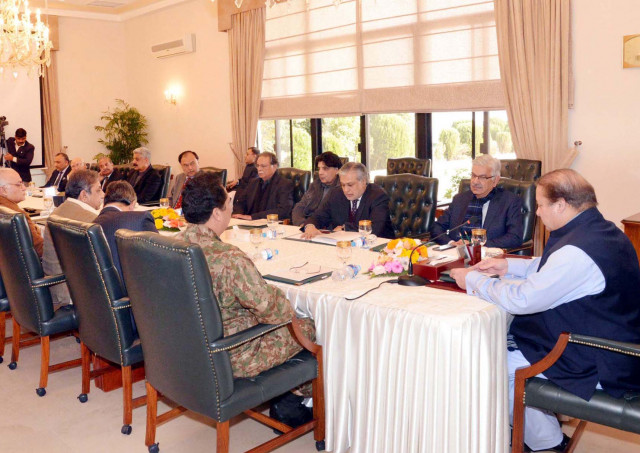Civil-military huddle: Govt decides to amend constitution, form military courts
Will table a bill in upcoming NA session and get it approved.

Civil-military huddle: Govt decides to amend constitution, form military courts
The government is planning to introduce a constitutional amendment bill in the upcoming National Assembly session that will sanction the creation of military courts.
At the session summoned on Thursday, the government is hoping to push it through parliament either through consensus or majority vote.
The decision was taken at a marathon meeting in which civil and military leadership reviewed progress on implementation of the National Action Plan (NAP) on counter terrorism, sources told The Express Tribune.
The meeting was chaired by Prime Minister Nawaz Sharif, while key ministers – Chaudhry Nisar Ali Khan, Ishaq Dar, Ahsan Iqbal, Pervaiz Rashid, Abdul Qadir Baloch as well as Chief of the Army Staff General Raheel Sharif, Director General ISI Lt Gen Rizwan Akhtar and the director general Military Operations participated in the huddle, said an official statement.

Sources said that the civil leadership presented various proposals for establishment of military courts and apprised the military leadership of the latest developments in this regard.
The military leadership was told that all political parties, which also viewed the creation of military courts in the December 24 meeting, supported the move but some of their legal representatives have objected to the idea on an individual basis.
After discussing several proposals, the civil and military leadership agreed to pave way for military courts through constitutional amendment or with a majority vote, if necessary. Sources said the military feared that such courts formed without a constitutional amendment might be challenged in the apex court.
According to sources, the government team has proposed creation of military courts under the framework of Article 256 and put it in first schedule of the Constitution of Pakistan. Article 256 says that: “No private organisation capable to functioning as military organisation shall be formed and such organisation shall be illegal”.
The legal team has suggested that while the execution of Articles 256 does not violate fundamental rights [just like execution of Article 6, which covers high treason and Article 204, which covers contempt of the court], the said Article does not have a proper framework to prosecute or execute the accused.

The government has suggested that the military courts should be established under the framework of Article 256 and be protected in the first schedule of the Constitution.
There are also other minor technicalities as well in the proposed bill. The first schedule exempts certain types of laws from invoking fundamental rights under Article 8 (1) and (2) of the Constitution.
Sources said civil and military leadership asked government’s legal team to approach legal experts of other political parties on Wednesday (today) and to convince them to develop consensus on establishment of the courts through constitutional amendment.
According to sources, participants also discussed, reviewed and finalised recommendations of the 15 sub committees formed on Saturday to develop road maps for the implementations of the NAP’s 20-points.
Most of the civil and military leaders approved the implementation plans but put some of the sub-committees’ recommendations for further deliberations.
The meeting also reviewed actions plans to block terror financing and break the terror communication network. Progress on action against illegal SIMs was also reviewed.
Speaking at the occasion, the PM said special courts are part of national action plan and an extraordinary solution of an extraordinary problem.
“All institutions will carefully scrutinise cases before prosecution in the special military tribunals,” the PM said, adding that national plan is a manifestation of national consensus and “we will ensure swift implementation.”
According to a statement issued by the PM House, the premier said: “We have isolated terrorists with our unity and will make sure that we remain united against those who killed the innocent children.”
The PM said the government’s future and ultimate objective is a peaceful and secure Pakistan. “And our armed forces have paved the way for it through Operation Zarb-e-Azb,” he added.
Published in The Express Tribune, December 31st, 2014.


















COMMENTS
Comments are moderated and generally will be posted if they are on-topic and not abusive.
For more information, please see our Comments FAQ